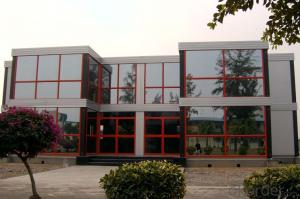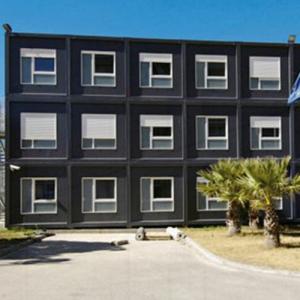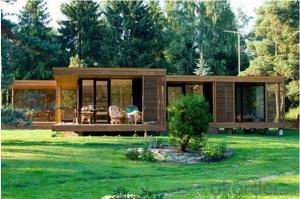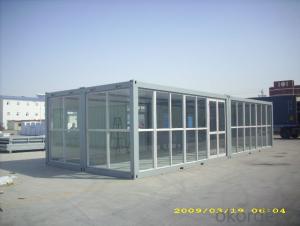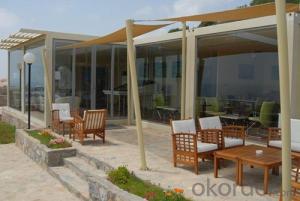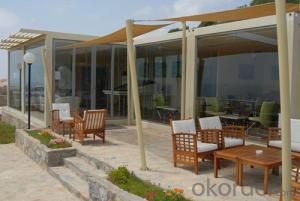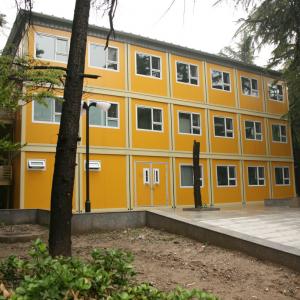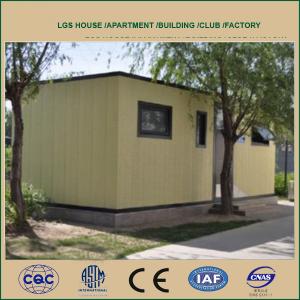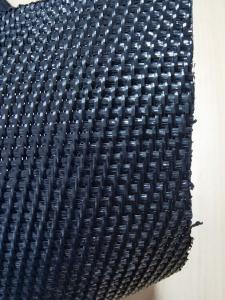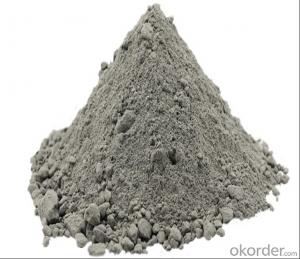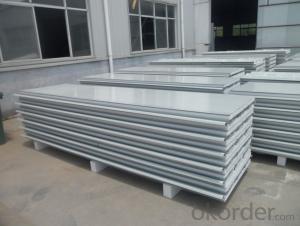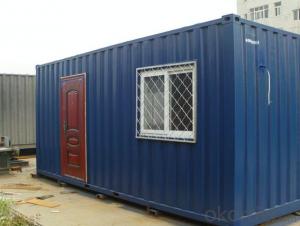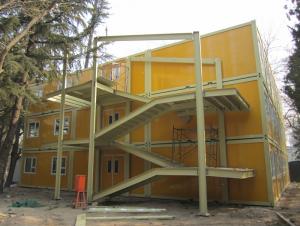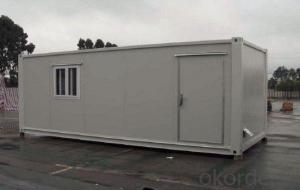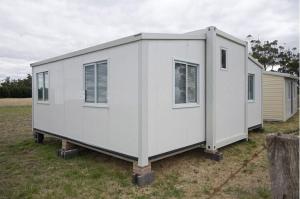Container house for
- Loading Port:
- China Main Port
- Payment Terms:
- TT OR LC
- Min Order Qty:
- -
- Supply Capability:
- -
OKorder Service Pledge
OKorder Financial Service
You Might Also Like
Product:
20ft Container House,Movable House,Prefab House,Mobile House,Modular House,Low-cost Office,Toilet,Shower
Specification: 5910*2438*2591mm
No. | Part Name | Material |
1 | Foundation | Square Tube |
2 | Corner Post | Steel |
3 | Floor Beam | C Shape Steel |
4 | Roof Beam | C Shape Steel |
5 | Connection Plate | Steel |
6 | Edge Covering | Steel Plate |
7 | Wall | Sandwich Panel, optional |
8 | Flooring | Plywood+Vinyl Flooring/Laminate Flooring, optional |
9 | Roof | Corrugated Sandwich Panel, optional |
10 | Door | Sandwich Panel with aluminum doorframe |
11 | Doorlock | Stainless Steel |
12 | Window | Plastic Steel or Aluminum |
Plan:
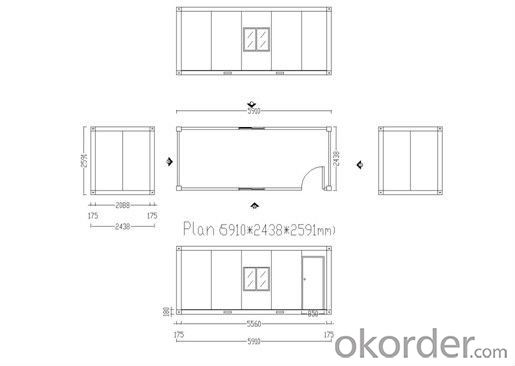
- Q:Are container houses suitable for vacation homes or cabins?
- Yes, container houses can be suitable for vacation homes or cabins. Container houses are becoming increasingly popular for this purpose due to their versatility, affordability, and sustainability. They can be easily customized to fit specific vacation home or cabin needs, whether it's a small cozy space or a larger, more luxurious retreat. Container houses offer a unique and modern aesthetic that can blend well with natural surroundings, making them a great choice for vacation homes or cabins in scenic locations. They can be designed to maximize natural light and provide panoramic views of the surrounding landscape. In terms of affordability, container houses are generally less expensive than traditional vacation homes or cabins. The cost of purchasing and converting a shipping container into a living space is significantly lower compared to building a traditional structure. This affordability can be particularly appealing for those looking for a budget-friendly vacation home or cabin option. Additionally, container houses are eco-friendly and sustainable. By repurposing shipping containers, we can reduce waste and the environmental impact of construction. Container homes can also be built to be energy-efficient, with features such as insulation, solar panels, and rainwater harvesting systems, reducing their carbon footprint. While container houses can be suitable for vacation homes or cabins, it's important to consider some factors before making a decision. For example, the size of the container, zoning regulations, and the availability of utilities and services in the desired location should be taken into account. However, with proper planning and customization, container houses can provide a unique and comfortable vacation home or cabin experience.
- Q:Are container houses suitable for art galleries or exhibition spaces?
- Container houses can be a suitable choice for art galleries or exhibition spaces, as they offer several advantages. Their modular nature allows for easy customization and flexibility in creating unique and dynamic spaces. Additionally, the industrial and minimalist aesthetic of container houses can complement and enhance various art styles. Moreover, container houses are cost-effective and sustainable, making them an attractive option for artists or organizations with limited budgets and a focus on environmental consciousness. Overall, container houses can provide a creative and practical solution for art galleries or exhibition spaces.
- Q:Are container houses suitable for bed and breakfast establishments?
- Container houses can indeed be suitable for bed and breakfast establishments. In recent years, container houses have gained popularity due to their affordability, sustainability, and flexibility. These houses can be easily transformed into comfortable and cozy accommodations, making them an ideal choice for bed and breakfast establishments. One of the main advantages of container houses is their cost-effectiveness. Compared to traditional construction methods, container houses are significantly cheaper to build and maintain. This affordability allows bed and breakfast owners to invest their resources in other areas such as marketing, decor, or amenities, enhancing the overall guest experience. Container houses are also highly sustainable. As they are repurposed shipping containers, they contribute to recycling efforts and reduce waste. Additionally, they can be equipped with energy-efficient features such as solar panels, rainwater harvesting systems, and low-flow fixtures, minimizing their environmental impact. Moreover, container houses offer great flexibility in terms of design and layout. They can be easily customized to meet the specific needs and style of a bed and breakfast establishment. Multiple containers can be joined together, creating larger spaces or separate guest rooms. They can also be stacked or arranged in various configurations, maximizing the available space and allowing for different room arrangements. In terms of comfort, container houses can be insulated and outfitted with all the necessary amenities required for a bed and breakfast, such as heating and cooling systems, private bathrooms, and comfortable beds. With proper insulation and ventilation, container houses can provide a cozy and pleasant environment for guests. However, it is important to consider a few factors before choosing container houses for a bed and breakfast establishment. Firstly, it is crucial to check local regulations and building codes to ensure that container houses are allowed in the desired location. Additionally, hiring experienced professionals to handle the construction and customization process is essential to ensure the safety, durability, and comfort of the container house. Overall, container houses can be a suitable option for bed and breakfast establishments. Their affordability, sustainability, flexibility, and potential for customization make them an attractive choice for entrepreneurs in the hospitality industry.
- Q:Can container houses be stacked?
- Indeed, stacking is possible with container houses. In truth, one of the primary benefits of utilizing shipping containers for housing lies in their capacity to be effortlessly stacked and merged in order to form multi-level edifices. The robust steel framework of these containers permits secure stacking, thereby enabling vertical construction and optimal utilization of space. Moreover, container houses can be fashioned with fortified foundations and structural support to guarantee stability and safety during stacking. This stacking capability bestows remarkable flexibility for design, facilitating the construction of distinct and pioneering container homes and structures.
- Q:How do container houses compare to traditional houses in terms of construction time?
- Container houses typically have a significant advantage over traditional houses when it comes to construction time. Due to the pre-fabricated nature of shipping containers, they can be quickly and easily modified to create a living space. The construction process involves mainly converting and joining containers, which reduces the need for extensive foundation work and structural framing. As a result, container houses can be assembled and completed in a fraction of the time it takes to build a traditional house. Additionally, container houses have the advantage of being able to be constructed off-site, allowing for simultaneous work on the site and the container, further reducing construction time. Overall, container houses offer a much quicker construction timeline compared to traditional houses, making them a popular choice for those seeking a fast and efficient housing solution.
- Q:Can container houses be converted into offices or studios?
- Indeed, container houses have the potential to be transformed into offices or studios without a doubt. The adaptability and modular characteristics of container houses render them suitable for repurposing into various types of spaces, notably offices and studios. They offer a cost-effective and eco-friendly alternative to conventional construction methods, as containers are easily accessible and can be readily personalized to suit specific requirements. To convert container houses into comfortable and functional workspaces, one can incorporate insulation, windows, doors, and appropriate ventilation systems. The interior can be tailored to include separate rooms or open plan layouts, depending on the specific needs of the office or studio. Moreover, containers can be stacked or joined together to create larger spaces or multi-level structures, thus allowing for expansion and flexibility. The robust and secure nature of container houses also renders them suitable for office or studio environments. They are constructed to endure harsh weather conditions, ensuring the safety and protection of the occupants and their equipment. Additionally, container houses can be equipped with essential amenities such as electricity, plumbing, and internet connectivity, making them fully functional workspaces. The conversion of container houses into offices or studios not only offers a distinctive and visually appealing environment but also contributes to sustainable practices. By repurposing shipping containers, we reduce the demand for new construction materials and minimize waste. It serves as an innovative and environmentally conscious solution for creating contemporary, efficient, and adaptable workspaces.
- Q:Are container houses suitable for small business owners?
- Yes, container houses can be suitable for small business owners for several reasons. Firstly, container houses are cost-effective compared to traditional brick and mortar structures. Small business owners often have limited budgets, and container houses provide an affordable option for setting up a business location. Secondly, container houses are highly versatile and customizable. They can be modified and tailored to meet the specific needs of different types of businesses. Whether it is a retail store, office space, or a small café, container houses can be adapted to create a functional and attractive workspace. Additionally, container houses are portable and can be easily relocated. This feature is particularly beneficial for small business owners who may need to change their location or expand their business in the future. Container houses can be easily transported to a new site, saving time and money on construction costs. Moreover, container houses are eco-friendly and sustainable. They are often made from recycled materials, reducing the environmental impact associated with traditional construction methods. Small business owners can align their business with sustainable practices by choosing a container house as their workspace. Overall, container houses provide a practical and affordable solution for small business owners. They offer versatility, cost-effectiveness, portability, and eco-friendliness, making them a suitable option for entrepreneurs with limited resources but big ambitions.
- Q:Are container houses suitable for areas with limited access to public transportation?
- Indeed, container houses prove suitable in areas with restricted access to public transportation. Given their modular nature, they can be effortlessly transported to remote locations, rendering them a viable residential option where public transportation is scarce. Furthermore, these container houses can be designed to operate independently and off the grid, diminishing the reliance on public transportation for essential services such as electricity and water. By equipping them with solar panels and rainwater collection systems, their sustainability in regions with limited infrastructure is further augmented. Moreover, container houses can be tailor-made to meet the specific requirements of the occupants, ensuring their comfort and provision of all necessary amenities even in locales devoid of convenient public transportation. Ultimately, container houses present a flexible and pragmatic housing solution for areas with constrained access to public transportation.
- Q:Are container houses resistant to hurricanes or strong winds?
- Container houses can be resistant to hurricanes or strong winds if they are properly designed and constructed. The structural integrity of a container house largely depends on the modifications made to the shipping containers. Reinforcements such as additional steel beams, concrete foundations, and hurricane straps can be added to enhance their resistance to extreme weather conditions. Container houses that are built to withstand hurricanes and strong winds are usually designed to meet specific building codes and regulations. These codes and regulations take into account factors such as wind speed, uplift forces, and the overall stability of the structure. By following these guidelines, container houses can be made resilient to high winds and storms. It is important to note that the location of the container house also plays a significant role in its resistance to hurricanes. If the house is situated in a hurricane-prone area, additional precautions may need to be taken to ensure its durability. This could include securing the container house to a solid foundation, using impact-resistant windows, and implementing proper drainage systems to prevent flooding. Overall, container houses can be made resistant to hurricanes and strong winds, but it is crucial to work with experienced professionals who understand the specific requirements for building in high-wind areas. By incorporating the necessary modifications and adhering to building codes, container houses can provide a safe and durable living space even in areas prone to severe weather conditions.
- Q:Are container houses waterproof?
- Indeed, container houses have the capability to be rendered waterproof. The process of transforming shipping containers into habitable dwellings involves employing appropriate insulation and sealing methods to guarantee their complete water resistance. This entails fortifying the container's roof, walls, and floors with supplementary layers like insulation, waterproof membranes, and weather-resistant coatings. Furthermore, windows and doors are meticulously sealed to prevent any infiltration of water. By implementing suitable construction techniques and utilizing suitable materials, container houses can endure intense rainfall, storms, and various weather conditions, thereby safeguarding their interiors from the perils of water damage.
1. Manufacturer Overview |
|
|---|---|
| Location | |
| Year Established | |
| Annual Output Value | |
| Main Markets | |
| Company Certifications | |
2. Manufacturer Certificates |
|
|---|---|
| a) Certification Name | |
| Range | |
| Reference | |
| Validity Period | |
3. Manufacturer Capability |
|
|---|---|
| a)Trade Capacity | |
| Nearest Port | |
| Export Percentage | |
| No.of Employees in Trade Department | |
| Language Spoken: | |
| b)Factory Information | |
| Factory Size: | |
| No. of Production Lines | |
| Contract Manufacturing | |
| Product Price Range | |
Send your message to us
Container house for
- Loading Port:
- China Main Port
- Payment Terms:
- TT OR LC
- Min Order Qty:
- -
- Supply Capability:
- -
OKorder Service Pledge
OKorder Financial Service
Similar products
New products
Hot products
Hot Searches
Related keywords
